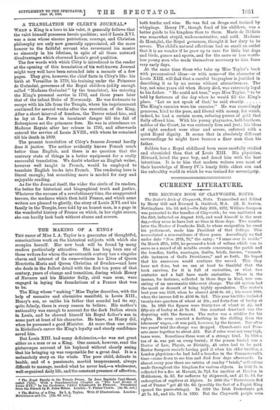THE MAKING OF A KING.t THE name of Miss L
A. Taylor is a guarantee of thoughtful, conscientious work on the historical subjects with which she occupies herself. Her new book will be found by many readers particularly attractive. She has long been one of those writers for whom the seventeenth century has a singular charm and interest of its own—witness her Lives of Queen Henrietta Maria and Queen Christina of Sweden—and here she deals in the fullest detail with the first ten years of that century, years of change and transition, during which Henry of Navarre and his Minister Sully, civil wars over, were engaged in laying the foundations of a France that was to be.
The King whose " making " Miss Taylor describes, with the help of memoirs and chronicles manifold, is Louis Henry's son, so unlike his father that scandal had its say, q,nite falsely, there is every reason to believe. His mother's nationality was enough to account for the dark Italian strain in Louis, and he showed himself his Royal father's son in some part at least of his character. He knew, as Henry did, when he possessed a good Minister. At more than one crisis in Richelieu's career the King's loyalty and steady confidence saved him.
But Louis MM. had many deficiencies,—he was not great either as a man or as a King. One cannot, however, read the picturesque account of his boyhood without clearly seeing that his bringing up was responsible for a great deal It is a melancholy story on the whole. The poor ohild, delicate in health, and of a passionate, morbid temperament, always difficult to manage, needed what he never had,—a wholesome, well-organised daily life, and the constant presence of affection,
• The Royal .Family in the Temple Prison. By Jean Baptiste Cant-Hanel, called Cl&y. With a Supplementary Chapter on "The Last Hours of Louis XVI.," by his Confessor, l'Abb41 Edgeworth de Firmont. Translated from the French by E. Jules Mesas. London : T. Fisher Unwin. Lim 6d. net.]
f The Making of a King. By L A. Taylor. With 17 Mustrations. London : Hutchinson and Co. [129. 6d. net.]
both tender and wise. He was fed on drugs and trained by whippings. Henry IV., though fond of his children, was a. better guide to his kingdom than to them. Marie de Modicis was somewhat stupid, undemonstrative, and cold. Madame de Montglat, the Royal governess, thought it her duty to be severe. The child's natural affections had so small an outlet that it is no wonder if he grew up to care for little but dogs and birds, games and sports, and for the more or less worth- less young men who made themselves necessary to him from very early days.
At the same time those who take up Miss Taylor's book with preconceived ideas—or with none—of the character of Louis XIII. will find that a careful biographer is justified in describing it as by no means without attractiveness. The boy, not nine years old when Henry died, was extremely loyal to his father. " He could not bear," says Miss Taylor, " to be told by flatterers of the day when he would fill the King's place. Let us not speak of that,' be said shortly The King's enemies were his enemies." He was exceedingly generous, kind to the poor, and liberal with money, for which, indeed, he had a certain scorn, refusing purses of gold that Sully offered him. With his young playmates, half-brothers, nobles of the Court, he was curiously firm and just; his ideas of right conduct were clear and severe, enforced with a quiet Royal dignity. It seems that in absolutely different surroundings he might have become a finer man than his father.
Seldom has a Royal childhood been more carefully studied and chronicled than that of Louis XIII. His physician, Heroard, loved the poor boy, and dosed him with the best intentions. It is to him that modern writers owe most of their knowledge of Henry IV.'s lonely little eldest son and the unhealthy world in which he was trained for sovereignty.






















































 Previous page
Previous page